
A report by the Probation Inspectorate flagged up particular concerns about children sharing hostels or bed and breakfast accommodation with adult strangers.
Inspectors found that while a minority of young people received excellent support, too many had been given a roof over their heads with little other than a few hours a week support from visiting professionals.
The report reveals that the issue was not down to a lack of funding, rather a result of poor or incomplete assessments, a lack of joined-up working or recognition of children's wider needs.
There was also a tendency to place children as though they were adults.
Inspectors also found that the range of suitable accommodation provision was limited and this resulted in some children being placed in accommodation that did not meet their needs.
The children whose cases were reviewed by inspectors were all found to have suffered some sort of trauma in their lives.
Most had previously been known to children's social care services and some were subject to care orders. They often exhibited difficult behaviour and were "not yet capable of independence".
Inspectors said it is not known how many 16- and 17-year-olds find themselves alone and relying on their local authority for accommodation to avoid homelessness, because data is not sufficiently comprehensive.
Chief Inspector of Probation Dame Glenys Stacey said: "The wider support children received was sometimes excellent but in other cases, woefully inadequate.
"Support for these children needs to be more consistent, effective and in line with the expectations set by the courts, so that they can successfully become independent adults."
Frances Crook, chief executive of The Howard League for Penal Reform, said: "It is simply unacceptable that children in children's services' care are being housed in accommodation that is unsafe or unsuitable.
"The law is clear. The Howard League helped to establish it, through judicial reviews and by working with external lawyers, based on our experience of supporting children in trouble. But while the law is there, too often the resources are not and that must change.
Register Now to Continue Reading
Thank you for visiting Children & Young People Now and making use of our archive of more than 60,000 expert features, topics hubs, case studies and policy updates. Why not register today and enjoy the following great benefits:
What's Included
-
Free access to 4 subscriber-only articles per month
-
Email newsletter providing advice and guidance across the sector
Already have an account? Sign in here

